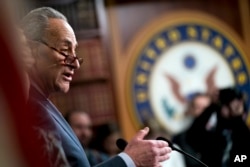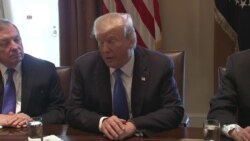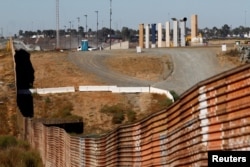U.S. President Donald Trump on Wednesday slammed the California judge who temporarily blocked the administration from ending the program that protects against the deportation of hundreds of thousands of immigrants who entered the country illegally when they were children.
"It just shows everyone how broken and unfair'' the court system is, Trump tweeted.
Trump's ire was aimed at U.S. District Judge William Alsup in California, who ruled in favor of a group of individuals and institutions, including the University of California, who had sued the government to block the end of the Deferred Action for Childhood Arrivals program (DACA). The program protects as many as 800,000 young immigrants from being deported.
The judge said the program should remain active until the legal challenges are resolved.
Senate Minority Leader Chuck Schumer, a New York Democrat, said the ruling was not enough to protect the young immigrants from deportation. He said lawmakers and the White House must drive toward a bipartisan deal that would permanently shield them from deportation.
"The iron is hot. We should strike now'' and reach a deal, he said.
Schumer also reiterated the Democrats' position that an immigration deal be attached to must-pass budget legislation that Congress will soon consider. Federal agencies will shut down unless lawmakers pass a bill financing them by January 19.
March deadline
In September, Trump rescinded DACA but gave Congress until March 5 to weigh in on the issue, which Trump debated at length with U.S. lawmakers on Tuesday in an unusual televised White House meeting.
Alsup ruled that those opposed to Trump's action ending the protections against deportation were "likely to suffer serious irreparable harm" if deportations were carried out and that the public interest would be served if the program continued.
Tuesday's order specified that the terms of the DACA program were to be maintained for anyone who was already covered by the program before Trump's September action, and that those people were allowed to renew their enrollments.
But the government does not have to process any new applications for people trying to enroll in DACA for the first time, and it remains free to deport anyone it determines to be a national security or public safety risk.
The court order came hours after Trump told key lawmakers he would sign whatever DACA legislation they agreed upon.
WATCH: Trump Signals Willingness to Compromise on Immigration Reform
In the Tuesday meeting at the White House, Trump said protection for the immigrants should come first and that comprehensive immigration reforms could be dealt with later. He said he still thought a wall needed to be built along at least part of the 3,200-kilometer (1,990-mile) U.S.-Mexico border, but he seemed to back off earlier demands that it be funded immediately.
"When this group comes back with an agreement, I'm signing it," Trump said.
Some of the Republican lawmakers pushed back on Trump's agreement to deal with young immigrants as a first priority. But as the discussion continued, Trump also said border security needed to be dealt with, as he left it up to the lawmakers to work out details.
Kirstjen Nielsen, Trump's new homeland security chief, told him, "Border security has to be part of this or we'll be back here three, four or five years from now," still dealing with illegal immigration from across the Mexico border.
Later, Trump said on Twitter, "As I made very clear today, our country needs the security of the Wall on the Southern Border, which must be part of any DACA approval."
During his 2016 presidential campaign, Trump vowed — to cheers from his political supporters — to build a wall along the Mexico border and make Mexico pay for it, an idea the Mexican government quickly rejected. At the White House meeting, Trump said a wall was, because of natural geographic barriers, not needed for the length of the border.
Last week, Trump called for an initial $18 billion in U.S. taxpayer funding for the wall, a proposal Democrats uniformly opposed, as did some Republican lawmakers.
A compromise — with protection for the young immigrants and some enhanced border security, without construction of the wall — could be reached. But making immigration policy changes has stymied U.S. lawmakers for years.








